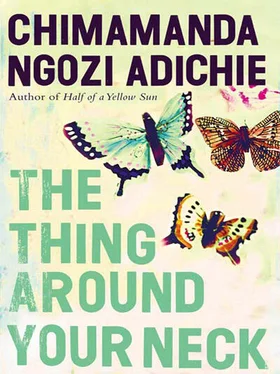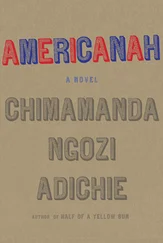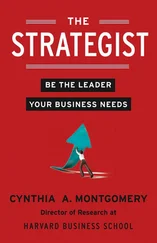The woman climbs back into the store. “Danger is finished. It is Abu. He is selling provisions. He is going to see his store. Everywhere policeman with tear gas. Soldier-man is coming. I go now before soldier-man will begin to harass somebody.”
Chika stands slowly and stretches; her joints ache. She will walk all the way back to her aunty’s home in the gated estate, because there are no taxis on the street, there are only army Jeeps and battered police station wagons. She will find her aunty, wandering from one room to the next with a glass of water in her hand, muttering in Igbo, over and over, “Why did I ask you and Nnedi to visit? Why did my chi deceive me like this?” And Chika will grasp her aunty’s shoulders tightly and lead her to a sofa.
Now, Chika unties the scarf from her leg, shakes it as though to shake the bloodstains out, and hands it to the woman. “Thank you.”
“Wash your leg well-well. Greet your sister, greet your people,” the woman says, tightening her wrapper around her waist.
“Greet your people also. Greet your baby and Halima,” Chika says. Later, as she walks home, she will pick up a stone stained the copper of dried blood and hold the ghoulish souvenir to her chest. And she will suspect right then, in a strange flash while clutching the stone, that she will never find Nnedi, that her sister is gone. But now, she turns to the woman and adds, “May I keep your scarf? The bleeding might start again.”
The woman looks for a moment as if she does not understand; then she nods. There is perhaps the beginning of future grief on her face, but she smiles a slight, distracted smile before she hands the scarf back to Chika and turns to climb out of the window.
Today I saw Ikenna Okoro, a man I had long thought was dead. Perhaps I should have bent down, grabbed a handful of sand, and thrown it at him, in the way my people do to make sure a person is not a ghost. But I am a Western-educated man, a retired mathematics professor of seventy-one, and I am supposed to have armed myself with enough science to laugh indulgently at the ways of my people. I did not throw sand at him. I could not have done so even if I had wished to, anyway, since we met on the concrete grounds of the university Bursary.
I was there to ask about my pension, yet again. “Good day, Prof,” the dried-up-looking clerk, Ugwuoke, said. “Sorry, the money has not come in.”
The other clerk, whose name I have now forgotten, nodded and apologized as well, while chewing on a pink lobe of kola nut. They were used to this. I was used to this. So were the tattered men who were clustered under the flame tree, talking loudly among themselves, gesturing. The education minister has stolen the pension money, one fellow said. Another said that it was the vice chancellor who had deposited the money in high-interest personal accounts. They cursed the vice chancellor: His penis will quench. His children will not have children. He will die of diarrhea. When I walked up to them, they greeted me and shook their heads apologetically about the situation, as if my professor-level pension were somehow more important than their messenger-level or driver-level pensions. They called me Prof, as most people do, as the hawkers sitting next to their trays under the tree did. “Prof! Prof! Come and buy good banana!”
I chatted with Vincent, who had been our driver when I was faculty dean in the eighties. “No pension for three years, Prof,” he said. “This is why people retire and die.”
“O joka,” I said, although he, of course, did not need me to tell him how terrible it was.
“How is Nkiru, Prof? I trust she is well in America?” He always asks about our daughter. He often drove my wife, Ebere, and me to visit her at the College of Medicine in Enugu. I remember that when Ebere died, he came with his relatives for mgbalu and gave a touching, if rather long, speech about how well Ebere had treated him when he was our driver, how she gave him our daughter’s old clothes for his children.
“Nkiru is well,” I said.
“Please greet her for me when she calls, Prof.”
“I will.”
He talked for a while longer, about ours being a country that has not learned to say thank you, about the students in the hostels not paying him on time for mending their shoes. But it was his Adam’s apple that held my attention; it bobbed alarmingly, as if just about to pierce the wrinkled skin of his neck and pop out. Vincent is younger than I am, perhaps in his late sixties, but he looks older. He has little hair left. I quite remember his incessant chatter while he drove me to work in those days; I remember, too, that he was fond of reading my newspapers, a practice I did not encourage.
“Prof, won’t you buy us banana? Hunger is killing us,” one of the men gathered under the flame tree said. He had a familiar face. I think he was my next-door neighbor Professor Ijere’s gardener. His tone had a half-teasing, half-serious quality, but I bought groundnuts and a bunch of bananas for them, although what all those men really needed was some moisturizer. Their faces and arms looked like ash. It is almost March, but the harmattan season is still very much here: the dry winds, the crackling static on my clothes, the fine dust on my eyelashes. I applied more lotion than usual today, and Vaseline on my lips, but still the dryness made my palms and face feel tight.
Ebere used to tease me about not moisturizing properly, especially in the harmattan, and sometimes after I had my morning bath, she would slowly rub her Nivea on my arms, my legs, my back. We have to take care of this lovely skin, she would say with that playful laughter of hers. She always said my complexion had been the trait that persuaded her, since I did not have any money like all those other suitors who had trooped to her flat on Elias Avenue in 1961. “Seamless,” she called my complexion. I saw nothing especially distinctive in my dark umber tone, but I did come to preen a little with the passing years, with Ebere’s massaging hands.
“Thank you, Prof!” the men said, and then began to mock one another about who would do the dividing.
I stood around and listened to their talk. I was aware that they spoke more respectably because I was there: carpentry was not going well, children were ill, more moneylender troubles. They laughed often. Of course they nurse resentment, as they well should, but it has somehow managed to leave their spirits whole. I often wonder whether I would be like them if I did not have money saved from my appointments in the Federal Office of Statistics and if Nkiru did not insist on sending me dollars that I do not need. I doubt it; I would probably have hunched up like a tortoise in its shell and let my dignity be whittled away.
Finally I said goodbye to them and walked toward my car, parked near the whistling pine trees that shield the Faculty of Education from the Bursary. That was when I saw Ikenna Okoro.
He called out to me first. “James? James Nwoye, is it you?” He stood with his mouth open and I could see that his teeth are still complete. I lost one last year. I have refused to have what Nkiru calls “work” done, but I still felt rather sour at Ikenna’s full set.
“Ikenna? Ikenna Okoro?” I asked in the tentative way one suggests something that cannot be: the coming to life of a man who died thirty-seven years ago.
“Yes, yes.” Ikenna came closer, uncertainly. We shook hands, and then hugged briefly.
We had not been good friends, Ikenna and I; I knew him fairly well in those days only because everyone knew him fairly well. It was he who, when the new vice chancellor, a Nigerian man raised in England, announced that all lecturers must wear ties to class, had defiantly continued to wear his brightly colored tunics. It was he who mounted the podium at the Staff Club and spoke until he was hoarse, about petitioning the government, about supporting better conditions for the nonacademic staff. He was in sociology, and although many of us in the proper sciences thought that the social sciences people were empty vessels who had too much time on their hands and wrote reams of unreadable books, we saw Ikenna differently. We forgave his peremptory style and did not discard his pamphlets and rather admired the erudite asperity with which he blazed through issues; his fearlessness convinced us. He is still a shrunken man with froglike eyes and light skin, which has now become discolored, dotted with brown age spots. One heard of him in those days and then struggled to hide great disappointment upon seeing him, because the depth of his rhetoric somehow demanded good looks. But then, my people say that a famous animal does not always fill the hunter’s basket.
Читать дальше











